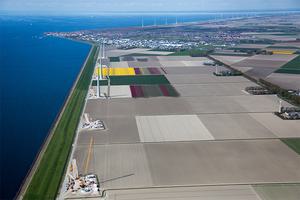Features
-
Unnatural Balance: How Food Waste Impacts World’s Wildlife
New research indicates that the food discarded in landfills and at sea is having a profound effect on wildlife populations and fisheries. But removing that food waste creates its own ecological challenges.
-
How Science Can Help to Halt The Western Bark Beetle Plague
Entomologist Diana Six is focused on the beetle infestation that is wiping out conifer forests in western North America. In an interview with Yale Environment 360, she explains why the key to combating this climate-related scourge is deciphering the trees’ genetic ability to adapt.
-
To Protect Monarch Butterfly, A Plan to Save the Sacred Firs
Mexican scientists are striving to plant oyamel fir trees at higher altitudes in an effort to save the species, as well as its fluttering iconic winter visitor — the migrating monarch butterfly — from the devastating effects of climate change.
-
Indonesian Coal Mining Boom Is Leaving Trail of Destruction
Since 2000, Indonesian coal production has increased five-fold to meet growing domestic demand for electricity and feed export markets in Asia. The intensive mining is leading to the clearing of rainforest and the pollution of rivers and rice paddies.
-
Why Paris Worked: A Different Approach to Climate Diplomacy
A more flexible strategy, a willingness to accept nonbinding commitments, and smart leadership by the French all helped secure a climate deal in Paris. The real work lies ahead, but Paris created a strong, if long overdue, foundation on which to begin building a carbon-free future.
-
Turning Point: Landmark Deal On Climate Is Reached in Paris
In what could be a turning point, the world’s nations reached an agreement in Paris that would commit them to cutting emissions and keeping global warming below 2 degrees. Although the pledges are not binding, the deal includes a review process to determine if countries are meeting their commitments.
-
Can Pulling Carbon from Air Make a Difference on Climate?
Numerous technologies exist to extract carbon dioxide from the atmosphere, and new companies are entering the field. But can CO2 ‘air capture’ scale up from a niche business to an industry that will lower atmospheric concentrations of CO2?
-
Canada’s Indigenous Bands Rise Up Against a Tar Sands Pipeline
TransCanada, the company behind the now-defunct Keystone XL, is proposing another pipeline that would ship Alberta tar sands oil to Canada’s Atlantic coast. But fierce opposition from First Nation communities could derail this controversial project.
-
Will Paris Conference Finally Achieve Real Action on Climate?
The emission pledges from the world’s nations still fall short of the goal for limiting global warming. But as negotiators convene in Paris this week, there is cautious optimism that a significant international agreement on climate can be reached.
-
For Storing Electricity, Utilities Are Turning to Pumped Hydro
High-tech batteries may be garnering the headlines. But utilities from Spain to China are increasingly relying on pumped storage hydroelectricity first used in the 1890s to overcome the intermittent nature of wind and solar power.
-
Why Brazil’s New Pledges On Carbon Emissions Fall Short
Brazil has won international acclaim for curbing deforestation. But Brazilian forestry expert Maria Fernanda Gebara says her country has not gone far enough in its pledges to cut carbon emissions and continues to have a dismal record on developing wind and solar power.
-
On Thin Ice: Big Northern Lakes Are Being Rapidly Transformed
As temperatures rise, the world’s iconic northern lakes are undergoing major changes that include swiftly warming waters, diminished ice cover, and outbreaks of harmful algae. Now, a global consortium of scientists is trying to assess the toll.
-
Not on This Land: A Western Tribe Takes a Stand and Says No to Big Coal
The Northern Cheyenne are opposing a proposed railroad that would cut through their ancestral lands to haul Montana coal to the Pacific coast for export. An e360 video reports on the Cheyenne’s fight against the railroad and the extraordinary coalition of tribal people and ranchers who have joined together to stop the project.
-
The Haunting Legacy of South Africa’s Gold Mines
Thousands of abandoned gold mines are scattered across South Africa, polluting the water with toxics and filling the air with noxious dust. For the millions of people who live around these derelict sites, the health impacts can be severe.
-
Beyond Keystone: Why Climate Movement Must Keep Heat On
It took a committed coalition and the increasingly harsh reality of climate change to push President Obama to reject the Keystone XL pipeline. But sustained public pressure will now be needed to force politicians to take the next critical actions on climate.
-
Will Indonesian Fires Spark Reform of Rogue Forest Sector?
Massive fires in Indonesia caused by the burning of forests and peatlands for agriculture have shrouded large areas of Southeast Asia in smoke this fall. But analysts say international anger over the fires could finally lead to a reduction in Indonesia’s runaway deforestation.
-
The Sushi Project: Farming Fish And Rice in California’s Fields
Innovative projects in California are using flooded rice fields to rear threatened species of Pacific salmon, mimicking the rich floodplains where juvenile salmon once thrived. This technique also shows promise for growing forage fish, which are increasingly threatened in the wild.
-
African Lights: Solar Microgrids Bring Power to Kenyan Villages
Small-scale microgrids are increasingly seen as the most promising way to bring electricity to the 1.3 billion people worldwide who currently lack it. In Kenya, an innovative solar company is using microgrids to deliver power to villages deep in the African bush.
-
How ‘Third Way’ Technologies Can Help Turn Tide on Climate
In a Yale Environment 360 interview, Australian scientist and author Tim Flannery explains how the development of technologies that mimic the earth’s natural carbon-removing processes could provide a critical tool for slowing global warming.

